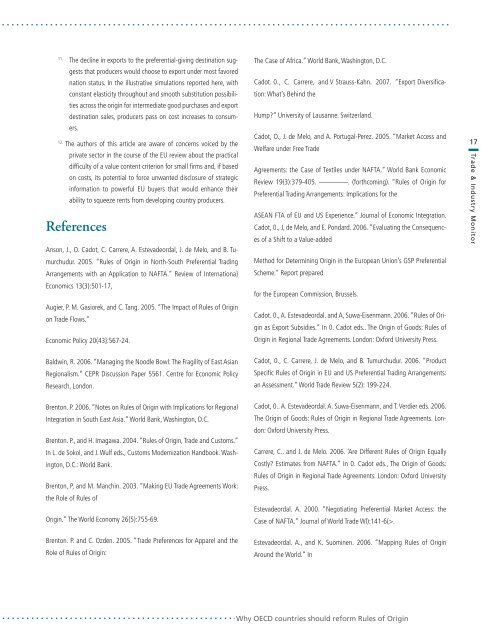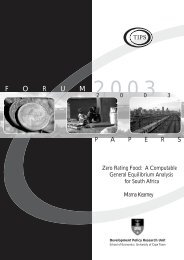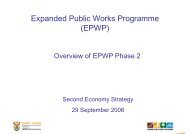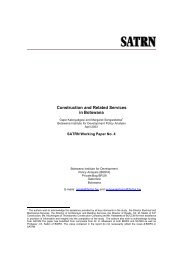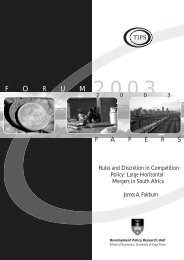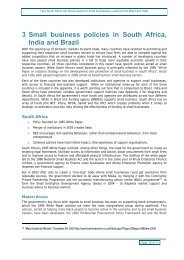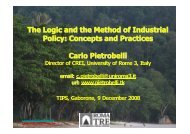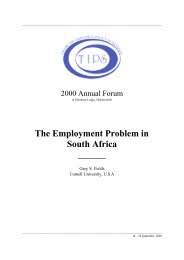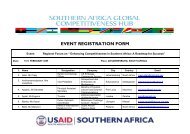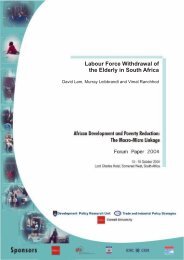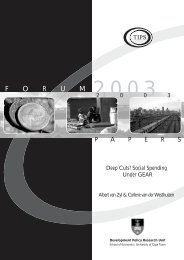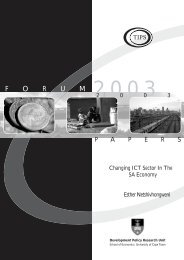Monitor Vol 39 08_Final_Nov08.pdf - tips
Monitor Vol 39 08_Final_Nov08.pdf - tips
Monitor Vol 39 08_Final_Nov08.pdf - tips
Create successful ePaper yourself
Turn your PDF publications into a flip-book with our unique Google optimized e-Paper software.
11.<br />
The decline in exports to the preferential-giving destination suggests<br />
that producers would choose to export under most favored<br />
nation status. In the illustrative simulations reported here, with<br />
constant elasticity throughout and smooth substitution possibilities<br />
across the origin for intermediate good purchases and export<br />
destination sales, producers pass on cost increases to consumers.<br />
12.<br />
The authors of this article are aware of concerns voiced by the<br />
private sector in the course of the EU review about the practical<br />
difficulty of a value content criterion for small firms and, if based<br />
on costs, its potential to force unwanted disclosure of strategic<br />
information to powerful EU buyers that would enhance their<br />
ability to squeeze rents from developing country producers.<br />
References<br />
Anson, J., O. Cadot, C. Carrere, A. Estevadeordal, J. de Melo, and B. Tumurchudur.<br />
2005. “Rules of Origin in North-South Preferential Trading<br />
Arrangements with an Application to NAFTA.” Review of Internationa}<br />
Economics 13(3):501-17,<br />
Augier, P. M. Gasiorek, and C. Tang. 2005. “The Impact of Rules of Origin<br />
on Trade Flows.”<br />
Economic Policy 20(43}:567-24.<br />
The Case of Africa.” World Bank, Washington, D.C.<br />
Cadot. 0., C. Carrere, and V Strauss-Kahn. 2007. “Export Diversification:<br />
What’s Behind the<br />
Hump?” University of Lausanne. Switzerland.<br />
Cadot, O., J. de Melo, and A. Portugal-Perez. 2005. “Market Access and<br />
Welfare under Free Trade<br />
Agreements: the Case of Textiles under NAFTA.” World Bank Economic<br />
Review 19(3):379-405. ————. (forthcoming). “Rules of Origin for<br />
Preferential Trading Arrangements: Implications for the<br />
ASEAN FTA of EU and US Experience.” Journal of Economic Integration.<br />
Cadot, 0., J, de Melo, and E. Pondard. 2006. “Evaluating the Consequences<br />
of a Shift to a Value-added<br />
Method for Determining Origin in the European Union’s GSP Preferential<br />
Scheme.” Report prepared<br />
for the European Commission, Brussels.<br />
Cadot. 0., A. Estevadeordal. and A, Suwa-Eisenmann. 2006. “Rules of Origin<br />
as Export Subsidies.” In 0. Cadot eds.. The Origin of Goods: Rules of<br />
Origin in Regional Trade Agreements. London: Oxford University Press.<br />
17<br />
Trade & Industry <strong>Monitor</strong><br />
Baldwin, R. 2006. “Managing the Noodle Bowl: The Fragility of East Asian<br />
Regionalism.” CEPR Discussion Paper 5561. Centre for Economic Policy<br />
Research, London.<br />
Cadot, 0., C. Carrere, J. de Melo, and B. Tumurchudur. 2006. “Product<br />
Specific Rules of Origin in EU and US Preferential Trading Arrangements:<br />
an Assessment.” World Trade Review 5(2): 199-224.<br />
Brenton. P. 2006. “Notes on Rules of Origin with Implications for Regional<br />
Integration in South East Asia.” World Bank, Washington, D.C.<br />
Brenton. P., and H. Imagawa. 2004. “Rules of Origin, Trade and Customs.”<br />
In L. de Sokol, and J. Wulf eds., Customs Modernization Handbook. Washington,<br />
D.C.: World Bank.<br />
Brenton, P, and M. Manchin. 2003. “Making EU Trade Agreements Work:<br />
the Role of Rules of<br />
Origin.” The World Economy 26{5):755-69.<br />
Cadot, 0.. A. Estevadeordal. A. Suwa-Eisenmann, and T. Verdier eds. 2006.<br />
The Origin of Goods: Rules of Origin in Regional Trade Agreements. London:<br />
Oxford University Press.<br />
Carrere, C.. and J. de Melo. 2006. ‘Are Different Rules of Origin Equally<br />
Costly? Estimates from NAFTA.” In 0. Cadot eds., The Origin of Goods:<br />
Rules of Origin in Regional Trade Agreements. London: Oxford University<br />
Press.<br />
Estevadeordal. A. 2000. “Negotiating Preferential Market Access: the<br />
Case of NAFTA.” Journal of World Trade Wl):141-6(>.<br />
Brenton. P. and C. Ozden. 2005. “Trade Preferences for Apparel and the<br />
Role of Rules of Origin:<br />
Estevadeordal. A., and K. Suominen. 2006. “Mapping Rules of Origin<br />
Around the World.” In<br />
Why OECD countries should reform Rules of Origin


